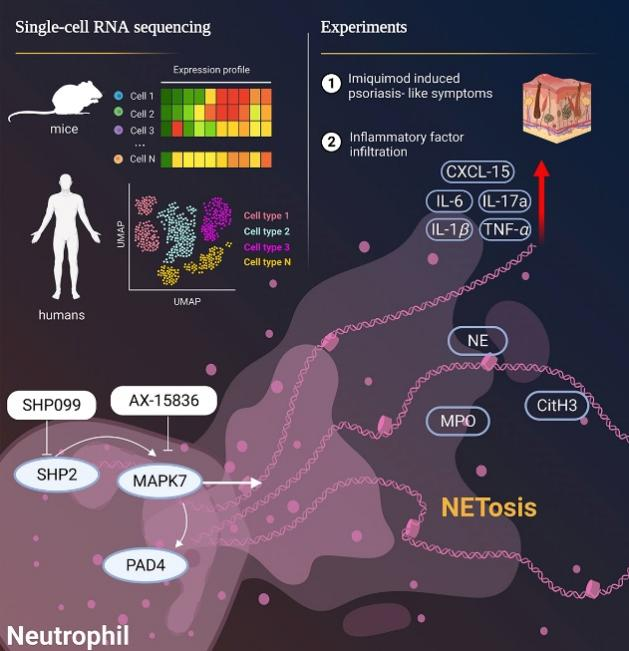MedComm | Tyrosine phosphatase SHP2 exacerbates psoriasis-like skin inflammation in mice via ERK5-dependent NETosis

Open the phone and scan
Psoriasis is a chronic inflammatory skin disease, often accompanied by increased infiltration of immune cells, especially neutrophils. However, the detailed mechanism of the neutrophil function in psoriasis progression remains unclear. Here, authors found that both Src homology-2 domain-containing protein tyrosine phosphatase-2 (SHP2) and neutrophils were highly correlated to developing psoriasis by single-cell ribonucleic acid (RNA) sequencing and experiment verification. The deficiency of SHP2 in neutrophils significantly alleviated psoriasis-like phenotype in an imiquimod-induced murine model. Interestingly, high levels of neutrophil extracellular traps (NETs) were produced in the inflamed lesions of psoriatic patients. In addition, imiquimod-induced psoriasis-like symptoms were remarkably ameliorated in peptidyl arginine deiminase 4 (PAD4) knockout mice, which cannot form NETs. Mechanistically, RNA-seq analysis revealed that SHP2 promoted the formation of NETs in neutrophils via the ERK5 pathway. Functionally, this mechanism resulted in the infiltration of pro-inflammatory cytokines such as TNF-α, IL-1β, IL-6, IL-17A, and CXCL-15, which enhances the inflammatory response in skin lesions and reinforces the cross-talk between neutrophils and keratinocytes, ultimately aggravating psoriasis. The findings uncover a role for SHP2 in NET release and subsequent cell death known as NETosis in the progression of psoriasis and suggest that SHP2 may be a promising therapeutic target for psoriasis.
It has been established that decreasing SHP2 can improve psoriasis symptoms, and NETosis can accelerate the process of psoriasis. However, the mechanism by which SHP2 modulates neutrophil NETosis remains unclear. Here, authors use the imiquimod (IMQ)-induced psoriasis mouse model to investigate the relationship between SHP2 and NETosis in neutrophils. In addition to that, RNA-seq and single-cell RNA sequencing technology were also used for better experimental guidance. Based on these data, they propose that SHP2 in neutrophils promotes the release of NETs through the ERK5 pathway, which aggravates psoriasis.

Single-cell RNA sequencing and experimental verification were combined to announce that SHP2 aggravates psoriasis-like skin inflammation in mice via ERK5-dependent NETosis
Article Access: https://doi.org/10.1002/mco2.120
Website for MedComm: https://onlinelibrary.wiley.com/journal/26882663
Looking forward to your contributions.


